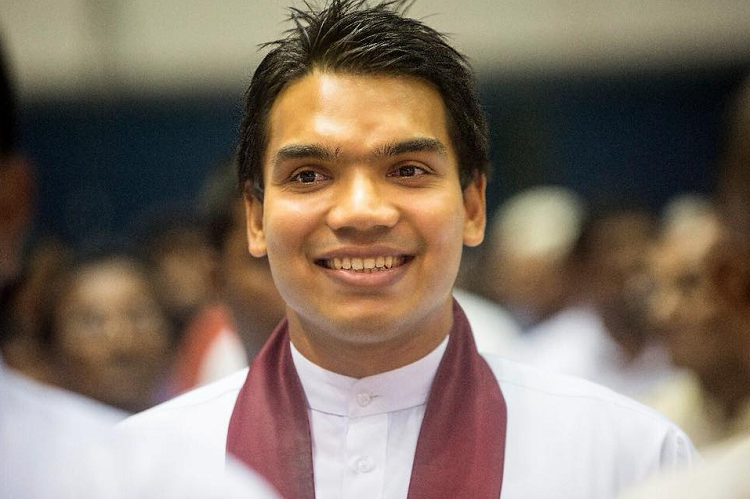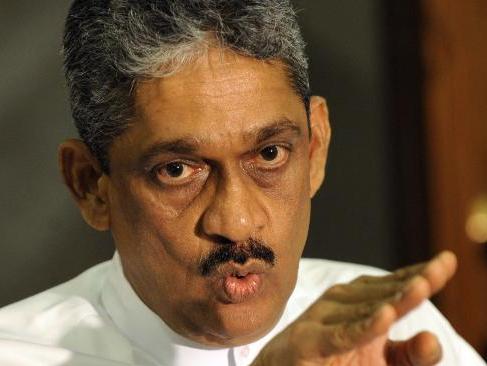By Sugeewara Senadhira/Daily News
Colombo, June 25: A rare cross-party agreement with a marked difference was seen in the Sri Lanka parliament earlier this week. Two parliamentarians with bitter experiences of spending time in detention, due to political witch-hunting according to them, saw eye-to-eye on the need for justice for those who are behind bars for long periods without trial.
When Youth Affairs and Sports Minister Namal Rajapaksa raised concerns in Parliament on Tuesday (June 22) over LTTE suspects held in remand for a long period without any legal action being taken against them, he received support from an unexpected quarter.
Field Marshal Sarath Fonseka readily endorsed the comments of the young Minister and urged the government to release the LTTE youths in detention. In a magnanimous gesture, Fonseka, a former Army Commander now an opposition Samagi Jana Balawegaya MP, said that the young Tamil terrorist who drove the vehicle of the female suicide bomber who blew herself up at the Army headquarters attempting to kill him when he was Army Commander, should also be pardoned and released.
Yesterday, on Poson Poya Day, President Gotabaya Rajapaksa ordered the release of 17 LTTE cadres imprisoned for several years. Furthermore the sentences of 216 prisoners, who had been sentenced to death more than 20 years ago, were commuted to life imprisonment. State Minister of Prisons Management and Prisoners’ Rehabilitation Lohan Ratwatte said those LTTE prisoners have served more time than the punishment due to them for their crimes.
It is true that there have been many advancements in the sphere of law in recent decades. But litigation has increased exponentially during the last 40 years which has resulted in inordinate delays. Judicial reforms are called for with the expansion of courts to ensure dispensation of early justice. For the last 40 years, there was a shortage of judges for lack of posts. The judicial cadre of both the Supreme Court and the Court of Appeal has remained static since the enactment of the Second Republican Constitution in 1978.
Recently, a welcome development took place with President Gotabaya Rajapaksa appointing six new Judges to the Supreme Court and 14 new Judges to the Court of Appeal, thus marking another milestone in the judicial system of the country.

As President Rajapaksa said on that occasion, amongst the many reasons that prompted this change is the perennial problem of law’s delays.
“Unfortunately, it is clear that while more and more cases were being instituted in the Superior Courts, there is insufficient judicial manpower to hear them fast and dispense justice. This is not a situation conducive to public confidence, nor to the proper functioning of the Republic,” he said.
Justice Minister Ali Sabry intervened in the discussion in the House, when Minister Namal Rajapaksa called on the Government to implement a mechanism to release people who have been imprisoned for several decades due to a delay in case proceedings. Sabry said: “Minister Namal Rajapaksa raised a very pertinent issue. We believe that action should be taken against any perpetrator in accordance with the law.”
Minister Namal Rajapaksa pointed out that the government has already rehabilitated more than 12,000 ex-LTTE cadres and recruited more than 3,000 of them to the Civil Security Force. He requested that this method be considered an option when meting out justice to the LTTE prisoners held in remand for a long period.
“There are many youths who could not obtain bail and complete their cases due to certain delays. A large number of them have been imprisoned on suspicion of terrorism for many years. During the Yahapalana government some of us including Ministers Johnston Fernando, Udaya Gammanpila, Wimal Weerawansa and Rohitha Abeygunawardena were remanded for a period of time. Thanks to that we were able to personally witness what was happening in prisons,” he said.
There are 35 convicted prisoners who have been in remand for a longer period than the actual sentence they received. There are 38 prisoners whose cases are pending before the High Court for more than 20 years. They are still in remand custody. There are 13 against whom no case has been filed. Then there are 116 against whom indictments had not been filed. In this context, a large number of young lives are being ruined. Either these people need to be prosecuted or be rehabilitated, the Minister said.
Prevention of Terrorism Act
Justice Minister Ali Sabry said that the government is looking at how the Prevention of Terrorism Act (PTA) could be revised to ensure the protection of those detained under this law without compromising national security. Referring to some LTTE cases, he said that certain prisoners had been held in detention over a long period of time and after charges had been filed against them and they were sentenced. It was evident that they had spent a period incarcerated, far exceeding their original sentence.

“Hence, our intention is to find a solution to this issue in accordance with the principles of Buddhism and all other religions. We have no intention of taking revenge. We intend to look into this issue comprehensively and come up with a reasonable solution. Caste, creed or religion are not relevant here as they are all Sri Lankans,” the Justice Minister said.
“The other issue is that we should not politicize this issue and we should all stop pointing fingers at one another. In this issue, we should all come together in finding a solution that is fair by all. We know what the previous regime did by appointing various committees which eventually resulted in taking revenge. But we are not going to take revenge from anyone.”
Minister Ali Sabry said, “Everyone will be able to see in the near future that we have turned our words into action. We are not trying to take revenge on anyone. We are trying to provide a solution according to Criminal Law. We want to provide justice for all regardless of their ethnicity or religion. We will initiate a procedure to complete the Court cases after consulting the Attorney General.”
While appointing new judges, President Gotabaya Rajapaksa pledged to support the Independence of the Judiciary and ensure that its functioning is free of politicization and other forms of interference. Access to justice is a Fundamental Right. It is the sacred duty and obligation of the State to provide an enabling environment to make that right real and not imaginary. Access to justice must be transparent if the people are to have confidence and faith in the judicial system.
“Whether we perform our role within the Executive, the Legislature or the Judiciary, we are all custodians of that faith. We hold our office in trust for the people. As Judges, the people look to you to uphold the immense dignities of your high office, to discharge your duties with integrity and independence, and to ensure that justice is dispensed equitably to all,” President Rajapaksa reminded the judges on that occasion.
Special Courts
The government has also set up Special Courts to speed up the judicial process. The appointment of new judges and the establishment of Special Courts will speed up trials and the dispensation of justice in the country. The efficient administration of justice is not only important in terms of upholding the rule of law, it is also vital for the economic development of this nation. Reliable, efficient and effective dispute resolution through the justice system will foster the Nation’s progress.
END





























































